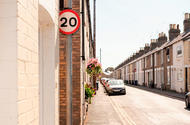Most 30mph roads in Wales are now 20mph
Professor warns against £32 million move as research finds cars become less efficient at low speed
Just weeks after the Welsh government implemented 20mph speed limits on most residential roads, a leading scientist has told Autocar that the move is unlikely to improve air quality in Wales – one of the scheme’s primary objectives.
Frank Kelly, a professor at Imperial College London and director of the Environmental Research Group at King’s College London, said: “With many urban roads already experiencing congestion during rush hours, speed is often already at 20mph or less, so I expect to see little further benefit to air quality in our towns and cities as a consequence of this new rule.”
The Labour-led Senedd implemented the 20mph limit on 17 September, applying it to most roads that had 30mph limits.
The move, which will cost £32 million, is intended to make roads safer and, by encouraging more people to walk or cycle, reduce the number of cars on them. The government has also said the new limit will reduce individual vehicle emissions, because less fuel will be used.
“Accelerating to 30mph can take twice as much energy as speeding up to 20mph,” reasoned a spokesman. Putting to one side Kelly’s observation that vehicles on many urban roads are already restricted by congestion to 20mph, the government’s claim is supported by research carried out in 2022 by the Transport Research Laboratory (TRL) into the effects of urban traffic, speed limits and driving style on fuel efficiency and emissions.
This found that the energy required to accelerate vehicles to the speed limit was the largest contributor to fuel consumption and emissions in urban traffic conditions.
“Vehicles are often more efficient at higher speeds, but this doesn’t account for the energy required to reach these speeds,” claimed the report.
“For the modelled Ford Focus Ecoboost, a cruising speed of 30mph, accounting for the acceleration phase, is only more efficient than a cruising speed of 20mph if the vehicle can drive for [0.3 miles] without stopping, which is unlikely under urban driving conditions.”
Nevertheless, according to Nick Molden, founder and CEO of vehicle testing firm Emissions Analytics, who contributed to the report, the TRL considered 25mph to be the optimum cruising speed (assuming that it could be maintained).
Meanwhile in England, Prime Minister Rishi Sunak is set to curb 20mph zones as he tackles anti motorist policies.
60 mph limits
In an effort to reduce emissions and improve air quality, National Highways is trialling 60mph limits on short sections of its network, including the M1, M4 and M6.
The focus of its research is on learning what impact reducing the speed limit from 70mph to 60mph has on NO2 levels. The locations it has chosen have levels exceeding the legal annual limit.
National Highways had intended to publish the results of the trials last spring but said the complexity of the data had caused a delay and that, in the meantime, the 60mph limits would remain in place. It said early indications are that the lower limit reduces emissions by 17%.
According to a review of the UK government-owned organisation’s methodology undertaken in 2019, especially concerning Euro 6-compliant petrol cars, any lower limit (for instance, 50mph) shows “significant variability in NOx emissions”.







